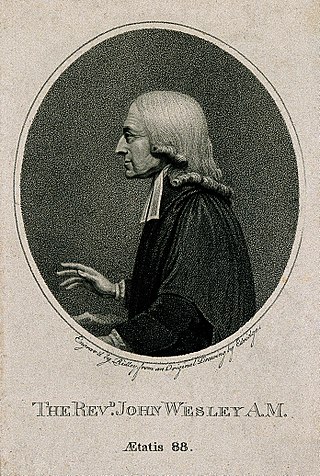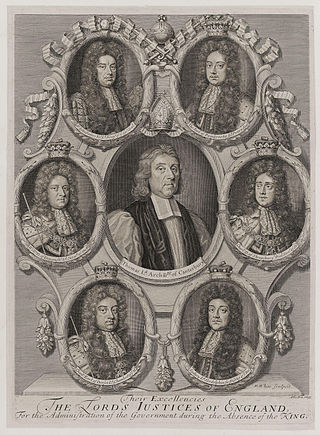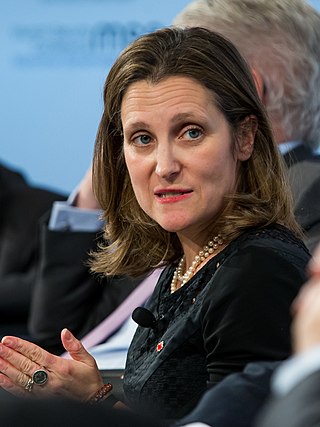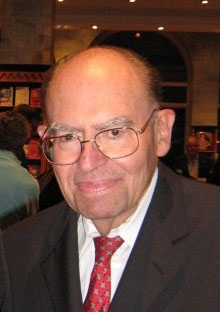A head of state is the public persona who officially embodies a state in its unity and legitimacy. Depending on the country's form of government and separation of powers, the head of state may be a ceremonial figurehead or concurrently the head of government and more.

A prime minister,premier or chief of cabinet is the head of the cabinet and the leader of the ministers in the executive branch of government, often in a parliamentary or semi-presidential system. Under those systems, a prime minister is not the head of state, but rather the head of government, serving as the principle administrator under either a monarch in a monarchy or a president in a republican form of government.

The prime minister of Canada is the head of government of Canada. Not outlined in any constitutional document, the office exists only per long-established convention. Under the Westminster system, the prime minister governs with the confidence of a majority of the elected House of Commons; as such, the prime minister typically sits as a member of Parliament (MP) and leads the largest party or a coalition of parties. The prime minister is appointed by the monarch's representative, the governor general, and, as first minister, selects other ministers to form the Cabinet and chairs it. Constitutionally, executive authority is vested in the monarch, but, in practice, the powers of the monarch and governor general are nearly always exercised on the advice of the Cabinet, which is collectively responsible to the House of Commons. Canadian prime ministers are appointed to the Privy Council and styled as the Right Honourable, a privilege maintained for life.

The prime minister of the United Kingdom is the head of government of the United Kingdom. The prime minister advises the sovereign on the exercise of much of the royal prerogative, chairs the Cabinet and selects its ministers. As modern prime ministers hold office by virtue of their ability to command the confidence of the House of Commons, they sit as members of Parliament.
The head of government is the highest or the second-highest official in the executive branch of a sovereign state, a federated state, or a self-governing colony, autonomous region, or other government who often presides over a cabinet, a group of ministers or secretaries who lead executive departments. In diplomacy, "head of government" is differentiated from "head of state".
Peerages in the United Kingdom form a legal system comprising both hereditary and lifetime titles, composed of various ranks, and within the framework of the Constitution of the United Kingdom form a constituent part of the legislative process and the British honours system. The term peerage can be used both collectively to refer to the entire body of titled nobility, and individually to refer to a specific title. British peerage title holders are termed peers of the Realm.

Baron is a rank of nobility or title of honour, often hereditary, in various European countries, either current or historical. The female equivalent is baroness. Typically, the title denotes an aristocrat who ranks higher than a lord or knight, but lower than a viscount or count. Often, barons hold their fief – their lands and income – directly from the monarch. Barons are less often the vassals of other nobles. In many kingdoms, they were entitled to wear a smaller form of a crown called a coronet.

The Reverend is an honorific style given before the names of certain Christian clergy and ministers. There are sometimes differences in the way the style is used in different countries and church traditions. The Reverend is correctly called a style, but is sometimes referred to as a title, form of address, or title of respect. The style is also sometimes used by leaders in other religions such as Judaism and Buddhism.

The prime minister of New Zealand is the head of government of New Zealand. The incumbent prime minister, Chris Hipkins, leader of the New Zealand Labour Party, took office on 25 January 2023.
A style of office or form of address, also called manner of address, is an official or legally recognized form of address for a person or other entity, and may often be used in conjunction with a personal title. A style, by tradition or law, precedes a reference to a person who holds a post or political office, and is sometimes used to refer to the office itself. An honorific can also be awarded to an individual in a personal capacity. Such styles are particularly associated with monarchies, where they may be used by a wife of an office holder or of a prince of the blood, for the duration of their marriage. They are also almost universally used for presidents in republics and in many countries for members of legislative bodies, higher-ranking judges, and senior constitutional office holders. Leading religious figures also have styles.

The deputy prime minister of the United Kingdom is the second highest ranking minister of the Crown and a member of the British Cabinet. The title is not always in use and prime ministers have been known to appoint informal deputies without the title of deputy prime minister. The incumbent deputy prime minister is Oliver Dowden.

The Right Honourable is an honorific style traditionally applied to certain persons and collective bodies in the United Kingdom, the former British Empire and the Commonwealth of Nations. The term is predominantly used today as a style associated with the holding of certain senior public offices in the United Kingdom, Canada, New Zealand, and, to a lesser extent, Australia.

Excellency is an honorific style given to certain high-level officers of a sovereign state, officials of an international organization, or members of an aristocracy. Once entitled to the title "Excellency", the holder usually retains the right to that courtesy throughout their lifetime, although in some cases the title is attached to a particular office and is held only during tenure of that office.
A minister of state is subordinate to a minister, who heads a ministry. The minister covers the entire ministry and the minister of state assists and performs other functions as assigned by the minister.

The deputy prime minister of Canada is a minister of the Crown and a member of the Canadian Cabinet. The office is conferred at the discretion of the prime minister and does not have an associated departmental portfolio. Canadian deputy prime ministers are appointed to the Privy Council and styled as the Honourable, a privilege maintained for life.

Herbert Eser Gray was a Canadian lawyer who became a prominent federal politician. He was a Liberal member of parliament for the Windsor area over the course of four decades, from 1962 to 2002, making Gray one of the longest-serving members in Canadian history. He was a cabinet minister under three prime ministers and was the seventh deputy prime minister from 1997 to 2002. Gray was Canada's first Jewish federal cabinet minister, and he is one of the few Canadians granted the honorific The Right Honourable who was not so entitled by virtue of a position held.
In Canada, a premier is the head of government of a province or territory. Though the word is merely a synonym for prime minister, it is employed for provincial prime ministers to differentiate them from the prime minister of Canada. There are ten provincial premiers and three territorial premiers. In most provinces and all territories, these persons are styled the Honourable only while in office, unless they are admitted to the King's Privy Council for Canada, in which case they retain the title even after leaving the premiership. In Nova Scotia and Alberta, former premiers are honorary members of the provincial Executive Council and thereby retain the style the Honourable for life.
In the United Kingdom, life peers are appointed members of the peerage whose titles cannot be inherited, in contrast to hereditary peers. With the exception of the Dukedom of Edinburgh awarded for life to Prince Edward in 2023, all life peerages conferred since 2009 have been created under the Life Peerages Act 1958 with the rank of baron and entitle their holders to sit and vote in the House of Lords, presuming they meet qualifications such as age and citizenship. The legitimate children of a life peer appointed under the Life Peerages Act 1958 are entitled to style themselves with the prefix "The Honourable", although they cannot inherit the peerage itself. Prior to 2009, life peers of baronial rank could also be so created under the Appellate Jurisdiction Act 1876 for senior judges.

The New Zealand Government is the central government through which political authority is exercised in New Zealand. As in most other parliamentary democracies, the term "Government" refers chiefly to the executive branch, and more specifically to the collective ministry directing the executive. Based on the principle of responsible government, it operates within the framework that "the [King] reigns, but the government rules, so long as it has the support of the House of Representatives". The Cabinet Manual describes the main laws, rules and conventions affecting the conduct and operation of the Government.
The Honourable or The Honorable is an honorific style that is used as a prefix before the names or titles of certain people, usually with official governmental or diplomatic positions.










